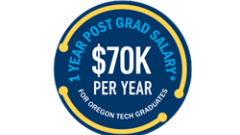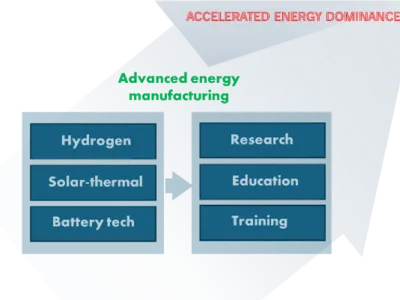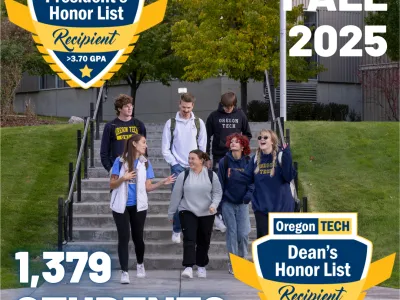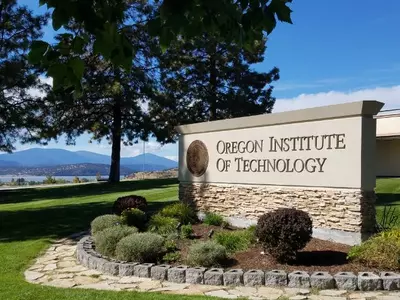Jesse M. Kinder, Ph.D., Associate Professor of Physics at Oregon Tech, traveled to Washington, D.C., in January for the American Physical Society (APS) Annual Leadership Meeting, an event that brings together physics leaders to enhance their skills, network with peers, and shape the physics community's future. Kinder was invited as a member of the executive committee of APS Northwest, which serves physicists primarily in Alberta, British Columbia, Idaho, Montana, Oregon, Washington, Wyoming, and Alaska.
Kinder has been a member of APS since 2006 and feels that APS is an important way to stay connected to the physics community, learn about the latest developments in physics, and share science with the public.
This year’s APS leadership meeting focused on public outreach and included a Congressional Visit Day, where small teams of APS members went to congressional offices to discuss science funding, STEM education, and other issues.
“I had the opportunity to advocate for new legislation: government funding for basic science and STEM education, more reasonable immigration policies for international students, climate research, and more inclusive practices in publicly funded research,” Kinder said. “This is another valuable function of the APS. One person talking to one politician might have some impact, but the APS Government Affairs team organized meetings with 99 congressional offices in one day. A hundred physicists — from graduate students to professors to directors of national labs — had a chance to deliver a common message to nearly a hundred U.S. representatives and senators.”
Representative Cliff Bentz, Oregon District 2, met with Kinder and other APS advocates during the visit.
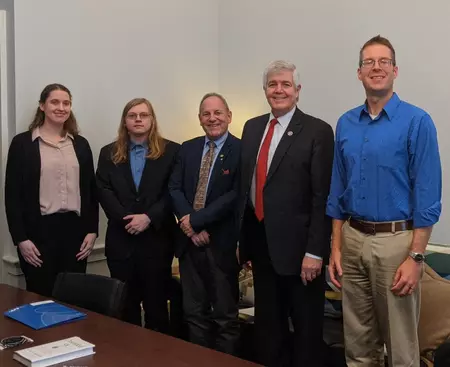
Ben Vaughan, Rochester Institute of Technology;
Dr. Joseph Niemela, Abdus Salam International Centre for Theoretical Physics;
Representative Cliff Bentz, Oregon District 2;
Dr. Jesse Kinder, Oregon Institute of Technology
“In addition to communication and outreach, I can share my unique experience with my students,” Kinder said. “I can tell them I went to Washington, D.C., to talk to Congress members about science policy. I have a photo of me and Congressman Cliff Bentz, our own Representative for District 2, in his office on Capitol Hill. I think it provides a different perspective on what it means to be a physicist and a scientist. It's also a fun way to start a conversation with someone who might otherwise have no interest in physics.”
APS also helps members learn new skills to introduce others to physics. Through APS, Kinder attended a Wiki Scientist Course, in which physicists learned to write and improve Wikipedia articles to share the latest developments in quantum physics with a wider audience. Since then, Kinder has written several articles and helped a student write her first Wikipedia article.
“It's easy for a physicist to forget that not many people are as interested in physics as physicists are. It is also important to build trust between scientists and the public,” Kinder said. “Scientists know a lot about their area of expertise, but if they cannot connect and communicate effectively, that knowledge gets lost in the background of all the sources of information — and misinformation — competing for people's attention. Scientists have something valuable to contribute, but no one will listen if we are boring or cannot explain things in language everyone can understand.”
Kinder also tries to apply this to his classroom teaching. “I think physics is fascinating, and I think anyone would benefit from learning physics. But if I cannot communicate what is interesting or useful about physics, my class becomes just one more hurdle on the way to a degree.”
This spring, Kinder will participate in a "Quantum To Go" program sponsored by APS, where he will visit a junior high or high school classroom to introduce quantum science and engineering to students.
“What I enjoy most about physics is the continual sense of discovery,” Kinder said. “If you keep asking simple questions — ‘How does that work? Why does that happen?’ — I think you almost always wind up in physics. Physicists don't have all the answers, but we ask a lot of good questions. And every answer leads to a dozen new questions, so there is always something new to learn.”
###


